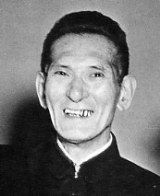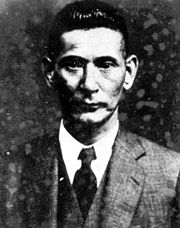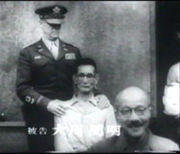
Okawa Shumei
Encyclopedia
was a Japanese nationalist
, Pan-Asian
writer and Islamic scholar.
, Japan in 1886. He graduated from Tokyo Imperial University in 1911, where he had studied Vedic
literature and classical Indian philosophy
. After graduation, Ōkawa worked for the Imperial Japanese Army General Staff doing translation work. He had a sound knowledge of German, French, English, Sanskrit
and Pali
.
In the summer of 1913 he read a copy of Sir Henry Cotton
's New India or Indian in transition (1886 revised 1905) which dealt with the contemporary political situation. After reading this book, Ōkawa abandoned "complete cosmopolitanism" (sekaijin) for Pan-Asianism. Later that year articles by Anagarika Dharmapala
and Maulavi Barkatullah
appeared in the magazine Michi, published by Dokai, a religious organization in which Ōkawa was later to play a prominent part.
After years of study of foreign philosophies, he became increasingly convinced that the solution to Japan's pressing social and political problems lay in a revival of traditional Japanese philosophy
and a renewed emphasis on the kokutai
principles.
 In 1918, Ōkawa went to work for the South Manchurian Railway Company, under its East Asian Research Bureau. Together with Ikki Kita he founded the nationalist discussion group and political club Yuzonsha. In the 1920s, he became an instructor of history and colonial policy at Takushoku University
In 1918, Ōkawa went to work for the South Manchurian Railway Company, under its East Asian Research Bureau. Together with Ikki Kita he founded the nationalist discussion group and political club Yuzonsha. In the 1920s, he became an instructor of history and colonial policy at Takushoku University
, where he was also active in the creation of right-wing and anti-capitalist
student groups.
In 1926, Ōkawa published his most influential work: , which was so popular that it was reprinted 46 times by the end of World War II. Ōkawa also became involved in a number of attempted coups d'état by the Japanese military in the early 1930s, including the March Incident
, for which he was sentenced to five years in prison in 1935. Released after only two years, he briefly re-joined the South Manchurian Railway Company before accepting a post as a professor at Hosei University
in 1939. He continued to publish numerous books and articles, helping popularize the idea that a "clash of civilizations
" between the East and West was inevitable, and that Japan was destined to assume the mantle of liberator and protector of Asia against the United States and other Western nations.
 After World War II, Ōkawa was prosecuted as a class-A war criminal by the Allies
After World War II, Ōkawa was prosecuted as a class-A war criminal by the Allies
. However, he started behaving erratically – hitting the bald head of the former prime minister Hideki Tōjō
, shouting "Inder! Kommen Sie!" (Come, Indian!) in German, and so on. Therefore, the presiding judge Sir William Webb (The President of the Tokyo Tribunal) concluded that he was mentally ill
and dropped the case against him. From the beginning of the tribunal, Ōkawa was saying that the court was a farce and not even worthy of being called a legal court. Therefore, some people still believe that he was feigning madness
.
, a famous mental hospital
, where he completed the first Japanese translation of the entire Quran. He was released from hospital in 1948. He died in Tokyo in 1957.
☆☆Best seller in Japan during the WW2☆☆
Japanese nationalism
encompasses a broad range of ideas and sentiments harbored by the Japanese people over the last two centuries regarding their native country, its cultural nature, political form and historical destiny...
, Pan-Asian
Pan-Asianism
Pan-Asianism is an ideology or a movement that Asian nations unite and solidify and create a continental identity to defeat the designs of the Western nations to perpetuate hegemony.-Japanese Asianism:...
writer and Islamic scholar.
Background
Ōkawa was born in Sakata, YamagataSakata, Yamagata
is a city located in Yamagata Prefecture, Japan.As of 2006, the city has an estimated population of 116,883 and the population density of 193.92 persons per km². The total area is 602.74 km².-History:The city was founded on April 1, 1933...
, Japan in 1886. He graduated from Tokyo Imperial University in 1911, where he had studied Vedic
Vedas
The Vedas are a large body of texts originating in ancient India. Composed in Vedic Sanskrit, the texts constitute the oldest layer of Sanskrit literature and the oldest scriptures of Hinduism....
literature and classical Indian philosophy
Indian philosophy
India has a rich and diverse philosophical tradition dating back to ancient times. According to Radhakrishnan, the earlier Upanisads constitute "...the earliest philosophical compositions of the world."...
. After graduation, Ōkawa worked for the Imperial Japanese Army General Staff doing translation work. He had a sound knowledge of German, French, English, Sanskrit
Sanskrit
Sanskrit , is a historical Indo-Aryan language and the primary liturgical language of Hinduism, Jainism and Buddhism.Buddhism: besides Pali, see Buddhist Hybrid Sanskrit Today, it is listed as one of the 22 scheduled languages of India and is an official language of the state of Uttarakhand...
and Pali
Páli
- External links :* *...
.
In the summer of 1913 he read a copy of Sir Henry Cotton
Henry John Stedman Cotton
Sir Henry John Stedman Cotton, KCSI had a long career in the Indian Civil Service, during which he was sympathetic to Indian nationalism...
's New India or Indian in transition (1886 revised 1905) which dealt with the contemporary political situation. After reading this book, Ōkawa abandoned "complete cosmopolitanism" (sekaijin) for Pan-Asianism. Later that year articles by Anagarika Dharmapala
Anagarika Dharmapala
Anagarika Dharmapala was a leading figure of Buddhism in the twentieth century. He was one of the founding contributors of Sinhalese Buddhist Nationalism and Protestant Buddhism...
and Maulavi Barkatullah
Maulavi Barkatullah
Maulavi Abdul Hafiz Mohamed Barakatullah or Maulana Barkatullah was a staunch anti-British Indian revolutionary with sympathy for the Pan-Islamic movement. Barkatullah was born on 7 July 1854 at Itwra Mohalla Bhopal in Madhya Pradesh, India...
appeared in the magazine Michi, published by Dokai, a religious organization in which Ōkawa was later to play a prominent part.
After years of study of foreign philosophies, he became increasingly convinced that the solution to Japan's pressing social and political problems lay in a revival of traditional Japanese philosophy
Japanese philosophy
Japanese Philosophy has historically been a fusion of both indigenous Shinto and the continental religions, such as Buddhism and Confucianism. Formerly heavily influenced by both Chinese philosophy and Indian philosophy, as with Mitogaku and Zen, much modern Japanese philosophy is now also...
and a renewed emphasis on the kokutai
Kokutai
Kokutai is a politically loaded word in the Japanese language, translatable as "sovereign", "national identity; national essence; national character" or "national polity; body politic; national entity; basis for the Emperor's sovereignty; Japanese constitution". "Sovereign" is perhaps the most...
principles.

Takushoku University
Takushoku University is a private university in Japan. It was founded in 1900 by Prince Taro Katsura . The university is located in Tokyo and has two campuses: the main campus in the Bunkyō district, and a satellite campus in the Hachiōji district...
, where he was also active in the creation of right-wing and anti-capitalist
Anti-capitalism
Anti-capitalism describes a wide variety of movements, ideas, and attitudes which oppose capitalism. Anti-capitalists, in the strict sense of the word, are those who wish to completely replace capitalism with another system....
student groups.
In 1926, Ōkawa published his most influential work: , which was so popular that it was reprinted 46 times by the end of World War II. Ōkawa also became involved in a number of attempted coups d'état by the Japanese military in the early 1930s, including the March Incident
March Incident
The ' was an abortive coup d'état attempt in Japan, in March 1931, launched by the radical Sakurakai secret society within the Imperial Japanese Army, aided by civilian ultranationalist groups.-Background and History:...
, for which he was sentenced to five years in prison in 1935. Released after only two years, he briefly re-joined the South Manchurian Railway Company before accepting a post as a professor at Hosei University
Hosei University
is a private university based in Tokyo, Japan.The university originated in a school of law, Tōkyō Hōgakusha , established in 1880, and the following year renamed Tōkyō Hōgakkō . This was from 1883 headed by Dr. Gustave Emile Boissonade, and was heavily influenced by the French legal tradition...
in 1939. He continued to publish numerous books and articles, helping popularize the idea that a "clash of civilizations
Clash of Civilizations
The Clash of Civilizations is a theory, proposed by political scientist Samuel P. Huntington, that people's cultural and religious identities will be the primary source of conflict in the post-Cold War world....
" between the East and West was inevitable, and that Japan was destined to assume the mantle of liberator and protector of Asia against the United States and other Western nations.
Tokyo War Crimes Tribunal

Allies of World War II
The Allies of World War II were the countries that opposed the Axis powers during the Second World War . Former Axis states contributing to the Allied victory are not considered Allied states...
. However, he started behaving erratically – hitting the bald head of the former prime minister Hideki Tōjō
Hideki Tōjō
Hideki Tōjō was a general of the Imperial Japanese Army , the leader of the Taisei Yokusankai, and the 40th Prime Minister of Japan during most of World War II, from 17 October 1941 to 22 July 1944...
, shouting "Inder! Kommen Sie!" (Come, Indian!) in German, and so on. Therefore, the presiding judge Sir William Webb (The President of the Tokyo Tribunal) concluded that he was mentally ill
Mental illness
A mental disorder or mental illness is a psychological or behavioral pattern generally associated with subjective distress or disability that occurs in an individual, and which is not a part of normal development or culture. Such a disorder may consist of a combination of affective, behavioural,...
and dropped the case against him. From the beginning of the tribunal, Ōkawa was saying that the court was a farce and not even worthy of being called a legal court. Therefore, some people still believe that he was feigning madness
Feigned madness
Feigned madness a term used in popular culture to describe the assumption of a mental disorder for purposes of evasion or deceit, or to divert suspicion, perhaps in advance of an act of revenge.-To avoid responsibility:...
.
Translation of Quran
Ōkawa was transferred from the jail to a US Army hospital in Japan, which concluded that he had mental instability. Later, he was transferred to the Tokyo Metropolitan Matsuzawa HospitalTokyo Metropolitan Matsuzawa Hospital
Tokyo Metropolitan Matsuzawa hospital is a public, 1,005-bed Psychiatric hospital located in Tokyo, Japan. It is the largest and oldest mental hospital in Japan, having been founded in 1879. It is the best Japanese authority in the area of psychiatry....
, a famous mental hospital
Mental Hospital
Mental hospital may refer to:*Psychiatric hospital*hospital in Nepal named Mental Hospital...
, where he completed the first Japanese translation of the entire Quran. He was released from hospital in 1948. He died in Tokyo in 1957.
Major publications
- Some issues in re-emerging Asia (復興亜細亜の諸問題), 1922
- A study of the Japanese spirit (日本精神研究), 1924
- A study of chartered colonisation companies (特許植民会社制度研究), 1927
- National History (国史読本), 1931
- 2600 years of the Japanese history (日本二千六百年史), 1939
- History of Anglo-American Aggression in East Asia (米英東亜侵略史), 1941
☆☆Best seller in Japan during the WW2☆☆
- Introduction to Islam (回教概論), 1942
- Quran (Japanese translation), 1950
Esternal links
- Takeuchi Yoshimi: "Profile of Asian Minded Man x: Okawa Shumei"
- Prof Dr. Selçuk Esenbel, Dozentin an der Bosporus-Universität: "Japan's Global Claim to Asia and the World of Islam: Transnational Nationalism and World Power, 1900–1945"
- Ōkawa hitting Dojo

